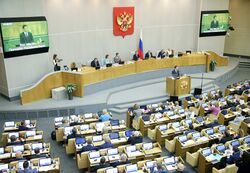Member of the State Duma
(parliamentarian) | |
|---|---|
 | |
The State Duma, commonly abbreviated in Russian as Gosduma, is the lower house of the Federal Assembly of Russia, while the upper house is the Council of the Federation. The Duma headquarters are located in central Moscow, a few steps from Manege Square. Its members are referred to as deputies. The State Duma replaced the Supreme Soviet as a result of the new constitution introduced by Boris Yeltsin in the aftermath of his 1993 coup (the Russian constitutional crisis of 1993), and approved by the Russian people in a referendum.
In the 2007 and 2011 Russian legislative elections a full party-list proportional representation with 7% electoral threshold system was used, but this was subsequently repealed. The legislature's term length was initially 2 years in the 1993–1995 elections period, and 4 years in 1999–2007 elections period; since the 2011 elections the term length is 5 years.
Any Russian citizen who is age 21 or older is eligible to participate in the election may be elected deputy to the State Duma.[1] However, that same person may not be a deputy to the Federation Council. In addition, a State Duma deputy cannot hold office in any other representative body of state power or bodies of local self-government. The office as deputy of the State Duma is a full-time and professional position. Thus, deputies to the State Duma may not be employed in the civil service or engage in any activities for remuneration other than teaching, research or other creative activities.
History
The history of the Duma dates back to the Boyar dumas of Kievan Rus' and Muscovite Russia as well to Tsarist Russia.[2] The State Duma was founded in 1905 after the violence and upheaval in the Russian Revolution of 1905 and was Russia's first elected parliament. The first two attempts by Tsar Nicholas II (1868-1918) to make it active were ineffective. Subsequently, each of these Dumas was dissolved after only a few months. The third Duma was the only one to last until the end of its five-year term. After the 1907 electoral reform, the third Duma, elected in November 1907, was largely made up of members of the upper classes, as radical influences in the Duma had almost entirely been removed. The establishment of the Duma after the 1905 Revolution was to herald significant changes to the previous Russian Imperial autocratic system. Furthermore, the Duma was later to have an important effect on Russian history, as it was one of the contributing factors in the February Revolution of 1917, the first of two that year, which led to the abolition of autocracy in Russia and the overthrow of the Tsar.
Several generations and 75 years later after another revolutionary era, in the December 1993 elections pro-Yeltsin parties won 175 seats in the Duma versus 125 seats for the left bloc. The balance of power lay with the sixty-four deputies of the ultranationalist Liberal Democratic Party of Russia. Only parties that won more than five percent of the vote were given party-list seats: eight passed the threshold in 1993. In addition to those eight parties, a pool of thirty-five deputies was entitled to form a registered group to reflect regional or sectoral interests. Business was governed by a steering committee, the Duma Council, consisting of one person from each party or group. The most important task was dividing up the chair positions in the Duma's twenty-three committees, which was done as part of a power-sharing "package" deal.
Office Holders on Wikispooks
| Name | From | To |
|---|---|---|
| Aleksandr Smirnov | 2012 | 2016 |
| Denis Voronenkov | 21 December 2011 | 5 October 2016 |
| Vladimir Zhirinovsky | 12 December 1993 | 6 April 2022 |
References
- ↑ Article 97 (2) Constitution of Russia
- ↑ https://www.britannica.com/topic/boyar